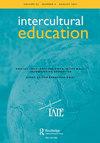Introduction
IF 0.8
Q3 EDUCATION & EDUCATIONAL RESEARCH
引用次数: 0
Abstract
The articles in this special issue are based upon a selection of presentations at the online IAIE conference, organised by the Kibbutzim College in Israel, in 2021. The wide range of 300 presentations reflected themes related to various aspects of the conference title: “Intercultural Education in an Age of Information and Disinformation”. They represented an extensive variety of research and case studies in disciplines relevant to intercultural education, such as: history, technology, education, art, language, and more. Together they demonstrated significant contributions to the field. Unfortunately, COVID-19 limited the conference to a virtual space, which, nevertheless, was designed as a most inviting venue. It enabled the more than 500 participants from all over the globe to find their way easily among the various “rooms”, and offered spaces where people could “meet” old and new colleagues to discuss common concerns. The following are brief summaries of the eight articles in this issue, representative of the major themes addressed at the conference. They reflect both local and global concerns and suggest possible applications for effective intercultural education. In light of the pandemic, the first article, based on the study: Adjustment to Emergency Remote Teaching during the COVID-19 Global Crisis among Diverse Students in Higher Education, attempts to identify factors that explain low rates of undergraduate students’ adjustments to emergency remote teaching (ERT) during the pandemic. The findings highlight various barriers that affected undergraduate students’ adjustments to ERT, related to gender, age, academic year, environmental and personal distractions, and metacognitive strategies. The second article: One Size Doesn’t Fit All – Educational Assessment in a Multicultural and Intercultural World, deals with attempts to challenge multicultural educational assessment. The authors discuss the need to change the educational assessment paradigm, adapt it to a multicultural world, the challenges involved, and potential ways of coping with these challenges. Educational assessment is also discussed in the article: Being Empathic in Complex Situations – A Practical Tool for Practice through Simulation-based Learning, which describes the use of the Delphi technique to develop and介绍
本期特刊的文章是根据以色列基布兹学院(Kibbutzim College)于2021年组织的IAIE在线会议上的演讲精选而成。300多份报告反映了与会议标题“信息和虚假信息时代的跨文化教育”的各个方面有关的主题。它们代表了与跨文化教育相关学科的广泛研究和案例研究,例如:历史、技术、教育、艺术、语言等。他们共同对这一领域作出了重大贡献。不幸的是,2019冠状病毒病将会议限制在虚拟空间,尽管这是一个最具吸引力的场所。它使来自世界各地的500多名参与者能够轻松地在各种“房间”之间找到自己的路,并提供了人们可以“遇见”新老同事讨论共同关心的问题的空间。以下是本期八篇文章的简要摘要,代表了会议讨论的主要主题。它们反映了当地和全球关注的问题,并为有效的跨文化教育提出了可能的应用。鉴于大流行,第一篇文章基于“2019冠状病毒病全球危机期间高等教育中不同学生对紧急远程教学的适应”研究,试图找出解释大流行期间本科生对紧急远程教学(ERT)适应率低的因素。研究结果强调了影响大学生适应ERT的各种障碍,这些障碍与性别、年龄、学年、环境和个人干扰以及元认知策略有关。第二篇文章:“一刀切——多元文化和跨文化世界中的教育评估”,探讨了对多元文化教育评估的挑战。作者讨论了改变教育评估范式的必要性,使其适应多元文化的世界,所涉及的挑战,以及应对这些挑战的潜在方法。教育评估也在文章中进行了讨论:在复杂的情况下进行移情-通过基于模拟的学习进行实践的实用工具,其中描述了使用德尔菲技术来开发和
本文章由计算机程序翻译,如有差异,请以英文原文为准。
求助全文
约1分钟内获得全文
求助全文
来源期刊

Intercultural Education
EDUCATION & EDUCATIONAL RESEARCH-
CiteScore
2.30
自引率
8.30%
发文量
36
期刊介绍:
Intercultural Education is a global forum for the analysis of issues dealing with education in plural societies. It provides educational professionals with the knowledge and information that can assist them in contributing to the critical analysis and the implementation of intercultural education. Topics covered include: terminological issues, education and multicultural society today, intercultural communication, human rights and anti-racist education, pluralism and diversity in a democratic frame work, pluralism in post-communist and in post-colonial countries, migration and indigenous minority issues, refugee issues, language policy issues, curriculum and classroom organisation, and school development.
 求助内容:
求助内容: 应助结果提醒方式:
应助结果提醒方式:


